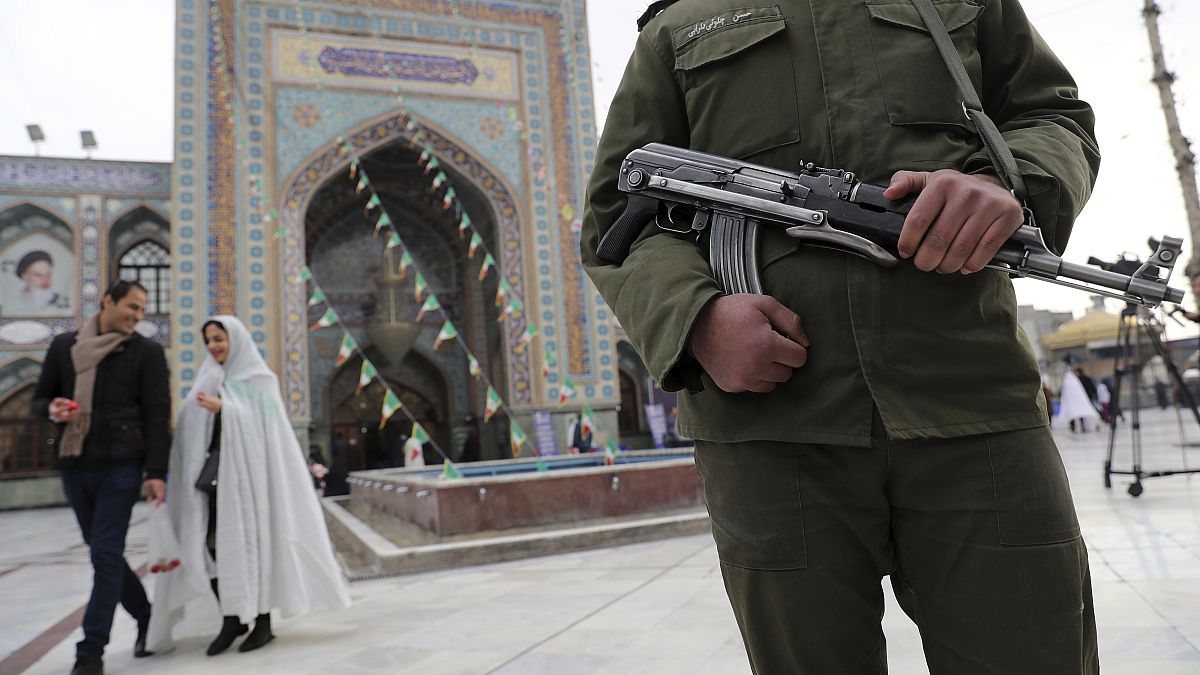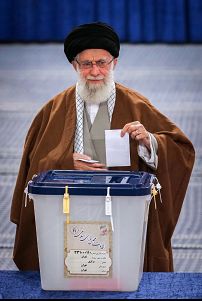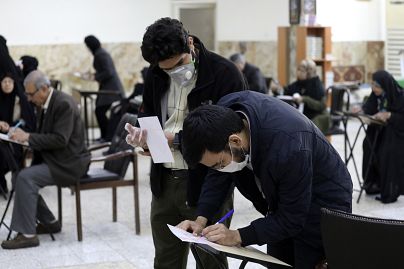Turnout will be seen as a key measure of support for Iran's leadership at the time of a sanctions-linked economic downturn and diplomatic isolation.
Conservatives are set for big gains as Iranians voted in parliamentary elections on Friday.
Thousands of moderate candidates were barred from running, while a context of economic hardship and US diplomatic pressure could further favour hardliners.
The disqualification of more than 7,000 potential candidates, most of them reformists and moderates, raised the possibility of lower-than-usual turnout.
Among those disqualified were 90 sitting members of parliament who had wanted to run for re-election.
The current parliament, elected in 2016, had more than 100 reformists and moderates, with the rest of the chamber split between independents and hardliners.
All eyes on turnout
Turnout will likely be seen as a key measure of support for Iran's leadership.
Authorities and state media urged voter participation, with some framing it as a religious duty.
Supreme Leader Ayatollah Ali Khamenei cast his ballot at a mosque near his Tehran office shortly after polls opened at 8 am and urged Iranians to the polls.
''Anyone who cares about Iran's national interests should participate in the election,'' he said.
Earlier in the week, Khamenei said high voter turnout will thwart ''plots and plans'' by Americans and supporters of Israel against Iran.
After casting his ballot, Iranian President Hassan Rouhani called on the nation to stage another ''victory'' by voting in huge numbers. ''Our enemies will be disappointed more than before,'' Rouhani said.
According to the Iranian agency Fars which is linked to the state, the participation was around 40% at 6:00 p.m. when the polling stations were meant to close.
Tensions with Washington
Tensions with the United States could strengthen hardliners by reinforcing long-held distrust of the West.
On the eve of the vote, the Trump administration ratcheted up its campaign of pressure on Iran by imposing sanctions on two senior officials.
The US also sanctioned three members of Iran's elections supervisory committee, saying all those targeted were responsible for silencing the voice of the Iranian people by rejecting thousands of people from running.
US Secretary of State Mike Pompeo criticised the election as a ''sham'' and a vote that is "not free or fair".
One of the sanctioned officials, Guardian Council's spokesman Abbas Ali Kadkhodaei, described Washington's latest move as "custom-made and illegitimate sanctions", dismissing the measure as just another example of America's "regional tyranny".
A parliament stacked with hardliners could favour expanding the budget for the Revolutionary Guard Corps, which has been sanctioned by the US. It could also tilt public policy debates toward hardliners who are opposed to engagement with the US.
The crisis between Tehran and Washington spiked after a US airstrike in January killed Iran's top general, Qassem Soleimani.
The strike led to a tense confrontation in which Iranian forces accidentally shot down a Ukrainian passenger plane after it took off from Tehran, killing all 176 people on board. Most of those killed were Iranian.
The shoot-down, and attempts by officials to initially conceal the cause of the crash, sparked public anger and protests in Iran.
Economic hardship
The election is being held at a time of growing economic hardship.
Iranians have seen the price of basic goods skyrocket, inflation and unemployment rise and the local currency plummet since President Donald Trump withdrew the US from Iran's nuclear agreement with world powers and imposed sanctions.
The economic woes faced by ordinary Iranians fueled anti-government protests in November. International human rights groups say at least 300 people were killed in the protests.
The parliament in Iran does not have the power to dictate major policies, but it does debate the annual budget and the possible impeachment of ministers.
Power in Iran ultimately rests with Khamenei, who has the final say on all key matters.
Coronavirus threat
Also looming over the election is the threat of the new coronavirus and many voters headed to the polls with face masks.
Iranian health authorities on Friday confirmed two new deaths from the virus, which first emerged in China in December, bringing the total death toll in Iran to four, from among 18 confirmed cases. The first two patients that died were elderly citizens in the city of Qom.
Concerns over the spread of the virus prompted authorities in Iran to close all schools and Shiite seminaries in Qom.
The Tehran governor tried to calm fears over the new virus, saying voters didn't have to mark their fingers with ink after voting. Using the ink was optional, said Anoushirvan Bandpay, according to the official IRNA news agency.
''People should not worry about spreading coronavirus,'' he added.
The polls close at 6 pm, though polling stations have in the past stayed open late into the night to give people more time to cast their vote.
Initial results are expected to be announced on Saturday. Presidential elections are expected to take place in 2021.


